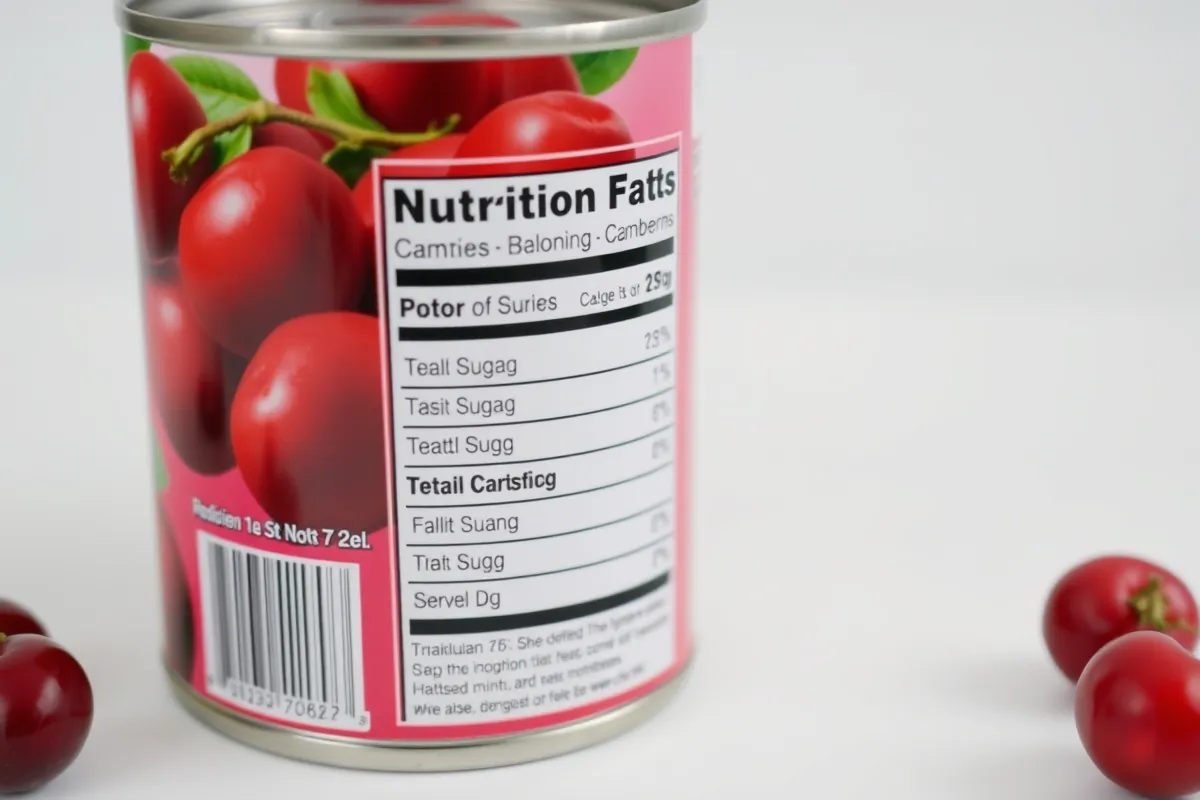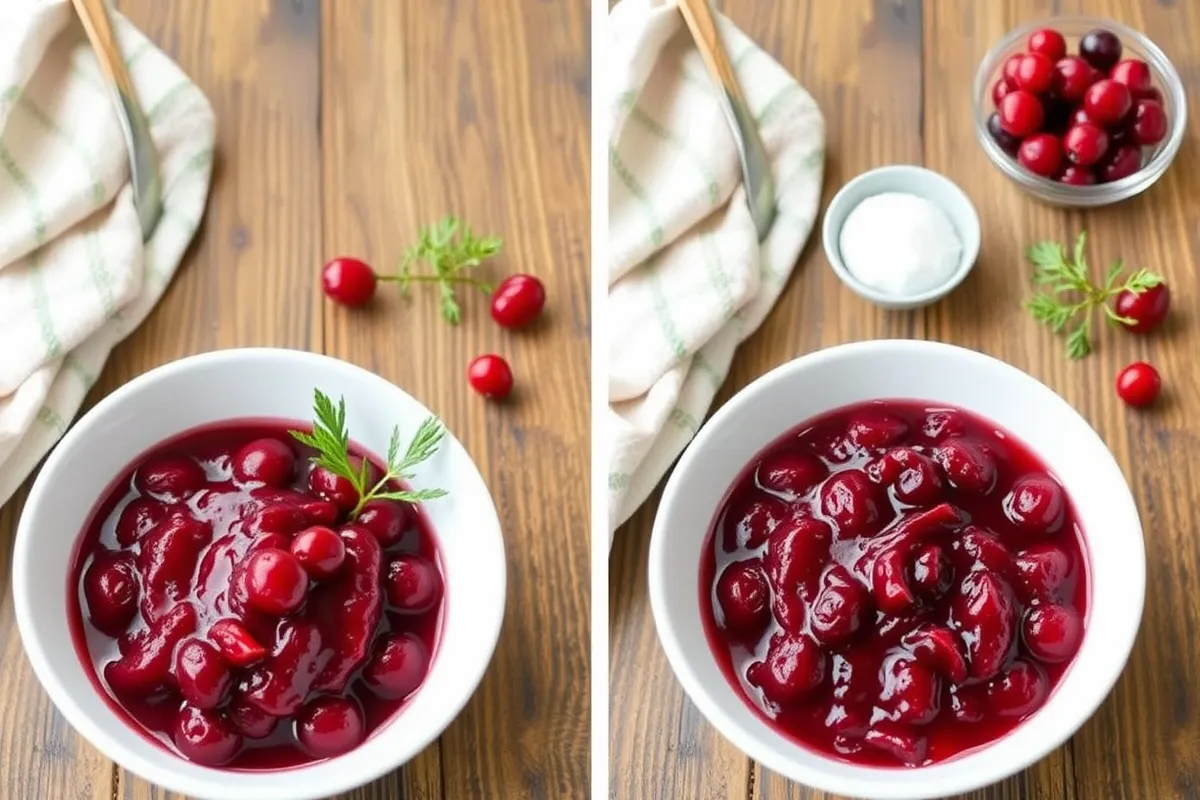Is Canned Cranberry Sauce Healthy? A Comprehensive Analysis
Cranberry sauce has been a holiday table staple for generations, but as we grow more conscious about what we eat, questions about its health benefits—or drawbacks—deserve a closer look. Is canned cranberry sauce a nutritious addition to your meals, or does it hide sneaky ingredients that could harm your health? In this article, we’ll break it down, diving into its nutritional profile, potential benefits, and risks, while comparing canned versions to homemade options. Let’s separate the facts from the myths and help you make an informed choice.
Introduction to Canned Cranberry Sauce
What Is Canned Cranberry Sauce?
Canned cranberry sauce is a ready-to-eat or ready-to-serve product made primarily from cranberries, sugar, and water, often with added stabilizers or preservatives. This jiggly or smooth condiment typically comes in two forms: jellied or whole berry. While jellied cranberry sauce is the more traditional version, both types maintain the tartness of fresh cranberries, albeit with a much sweeter flavor.
Overview of Common Ingredients
What’s inside a can of cranberry sauce? The base ingredient is, of course, cranberries, prized for their vibrant color and tart flavor. However, most canned versions also contain significant amounts of sugar—often high fructose corn syrup—as well as preservatives like citric acid or sodium benzoate. These additions help enhance shelf life and maintain the sauce’s texture but may raise concerns for health-conscious consumers.
Historical Context: The Role of Cranberry Sauce in Cuisine
Cranberry sauce has roots in North American cuisine, dating back to early settlers who utilized cranberries for their availability and tartness. It became a Thanksgiving tradition in the early 20th century when canned cranberry sauce made its debut as a convenient option. Today, it remains a symbolic holiday side dish, serving as a flavorful pairing for turkey and other festive fare.
That wraps up the introductory section. Ready to move on to Part 2: Nutritional Profile of Canned Cranberry Sauce?
Nutritional Profile of Canned Cranberry Sauce

Calories and Macronutrient Breakdown
Canned cranberry sauce is often marketed as a convenient side dish, but its calorie count deserves attention. A standard serving (about 1/4 cup) typically contains around 110 calories, largely derived from sugar. This small portion includes negligible amounts of fat and protein, making it a high-carb, low-nutrient option compared to fresh foods. While cranberries themselves are low in calories, the added sugars significantly increase the overall energy content.
Key Micronutrients: Vitamin C, Manganese, and Fiber
Despite its drawbacks, canned cranberry sauce does retain some of the cranberries’ natural benefits. It provides a small dose of vitamin C, essential for immunity and skin health, and manganese, which supports bone development and metabolism. The fiber content, although minimal, may contribute to digestive health, though it pales in comparison to fresh or minimally processed cranberries.
Sugar Content and High Fructose Corn Syrup: A Deep Dive
The elephant in the room is undoubtedly the sugar content. A single serving can pack up to 25 grams of sugar, with many products relying on high fructose corn syrup as a sweetener. Consuming such levels of added sugar regularly can raise concerns about weight gain, diabetes, and heart health. When asking, Is canned cranberry sauce healthy?, this high sugar load is often the reason people hesitate.
Health Benefits of Canned Cranberry Sauce
Antioxidants and Their Impact on Health
Cranberries are a powerhouse of antioxidants, including flavonoids and polyphenols. These compounds help combat free radicals, reducing oxidative stress and potentially lowering the risk of chronic diseases. While some antioxidants remain intact in canned cranberry sauce, the processing and added ingredients dilute their impact.
Potential Cardiovascular Benefits
Thanks to the natural flavonoids present in cranberries, this sauce could offer mild benefits for heart health. These compounds may help improve blood vessel function and reduce “bad” LDL cholesterol. However, these potential gains are often overshadowed by the high sugar content, which can negate cardiovascular advantages.
Role in Digestive Health: Fiber Content Explained
Although the fiber content in canned cranberry sauce is minimal, it can still aid digestion when consumed as part of a balanced diet. Fiber supports gut health, helping maintain regular bowel movements and potentially reducing the risk of colon issues.
Concerns and Risks of Canned Cranberry Sauce Consumption
High Sugar Levels and Their Implications
One of the most debated aspects of canned cranberry sauce is its high sugar content. Many products contain more than 20 grams of sugar per serving, which equates to nearly five teaspoons. Over time, consuming excessive sugar can contribute to health issues such as weight gain, diabetes, and increased inflammation. If you’re wondering, Is canned cranberry sauce healthy?, the sugar content alone might make you think twice.
Additives and Preservatives: What to Watch Out For
Canned cranberry sauce often includes preservatives like sodium benzoate or citric acid to maintain freshness and texture. While these are generally considered safe, some individuals may experience sensitivities to these ingredients. Additionally, artificial colors or stabilizers might be present in certain brands, raising further concerns for those trying to avoid processed foods.
Potential Allergens and GMO Ingredients
Did you know that the sweeteners in many canned cranberry sauces are derived from GMO sugar beets or high fructose corn syrup? For those avoiding genetically modified organisms (GMOs), this is a red flag. Furthermore, if you’re prone to food sensitivities, always check the label for hidden allergens that could impact your health.
Impact on Kidney Stones and Overconsumption Risks
Although cranberries are known for promoting urinary tract health, their oxalate content can increase the risk of kidney stones when consumed in large quantities. Coupled with the high sugar load in canned versions, overindulgence could exacerbate these risks.
Comparing Canned and Homemade Cranberry Sauce
A side-by-side look at canned cranberry sauce and its healthier homemade counterpart.
Nutritional Differences
When comparing canned and homemade cranberry sauce, the difference in nutritional value is striking. Homemade cranberry sauce often allows for greater control over sugar content and eliminates the need for artificial additives. This makes it a cleaner, healthier choice for those watching their diet.
Nutritional Content of Canned Cranberry Sauce (Per 100g):
Below is the nutritional breakdown of canned cranberry sauce (approximate values):
| Nutrient | Amount per 100g | % Daily Value* |
|---|---|---|
| Calories | 180 kcal | 9% |
| Total Fat | 0.1 g | 0% |
| Saturated Fat | 0 g | 0% |
| Cholesterol | 0 mg | 0% |
| Sodium | 20 mg | 1% |
| Total Carbohydrate | 45 g | 15% |
| Dietary Fiber | 1 g | 4% |
| Total Sugars | 40 g | – |
| Protein | 0.1 g | 0% |
| Vitamin C | 2 mg | 2% |
| Calcium | 4 mg | 0% |
| Iron | 0.2 mg | 1% |
Taste and Texture: Consumer Preferences
Canned cranberry sauce has a consistent, gelatinous texture that some people love for its nostalgia. However, homemade sauce, made with whole cranberries, offers a fresher, tangier flavor that better highlights the fruit’s natural tartness. For many, this trade-off makes homemade a preferred choice for holidays or special meals.
Cost and Convenience Trade-offs
Canned cranberry sauce wins in terms of convenience—it’s ready to serve straight out of the can, making it perfect for busy cooks. However, homemade cranberry sauce can often be made for a comparable price, especially if cranberries are in season. Plus, it allows for personalization with spices, orange zest, or less sugar.
For more creative ideas, check out GrateRecipes’ article on creative uses for canned cranberry sauce. It’s packed with inspiring ways to make this classic side dish shine!
Tips for Choosing a Healthier Canned Cranberry Sauce
Reading Labels: Ingredients to Avoid
When shopping for canned cranberry sauce, the first step to making a healthier choice is to carefully read the label. Avoid products with high fructose corn syrup, artificial colors, or a long list of unrecognizable ingredients. Instead, opt for brands that use natural sweeteners like cane sugar or fruit juice. This simple switch can help you reduce the risk of consuming unnecessary additives and excess sugar.
Organic and Non-GMO Options
For those concerned about GMOs or synthetic pesticides, choosing organic cranberry sauce is a great way to stay on the safer side. Organic options often eliminate the use of genetically modified ingredients, ensuring you’re getting a cleaner product. Look for certifications like “USDA Organic” or “Non-GMO Project Verified” to guide your choices.
Low-Sugar Alternatives: What to Look For
If you’re asking yourself, Is canned cranberry sauce healthy?, one way to answer “yes” is by choosing low-sugar varieties. Some brands now offer “reduced sugar” or “no sugar added” versions that retain the cranberry flavor without all the extra sweetness. Alternatively, consider sauces sweetened with natural alternatives like stevia or monk fruit for a guilt-free treat.
Frequently Asked Questions (FAQs)
Is Canned Cranberry Sauce High in Sugar?
Yes, most canned cranberry sauces are high in sugar, with many containing up to 25 grams per serving. This is equivalent to more than half the recommended daily intake for women, according to health guidelines.
Are There Any Healthier Store-Bought Options?
Absolutely! Many brands now offer healthier options, such as organic or reduced-sugar versions. Reading the ingredient list is crucial to finding a product that meets your dietary needs.
How Can I Make My Cranberry Sauce Healthier?
Making cranberry sauce at home is an excellent way to control its nutritional content. Use fresh cranberries, a natural sweetener like honey, and add spices such as cinnamon or cloves for flavor without the sugar overload.
Does Canned Cranberry Sauce Contain Preservatives?
Yes, most canned cranberry sauces contain preservatives like citric acid or sodium benzoate to extend shelf life. While these are generally considered safe, you may prefer preservative-free homemade options for peace of mind.
Tips for Choosing a Healthier Canned Cranberry Sauce
Reading Labels: Ingredients to Avoid
When shopping for canned cranberry sauce, the first step to making a healthier choice is to carefully read the label. Avoid products with high fructose corn syrup, artificial colors, or a long list of unrecognizable ingredients. Instead, opt for brands that use natural sweeteners like cane sugar or fruit juice. This simple switch can help you reduce the risk of consuming unnecessary additives and excess sugar.
Organic and Non-GMO Options
For those concerned about GMOs or synthetic pesticides, choosing organic cranberry sauce is a great way to stay on the safer side. Organic options often eliminate the use of genetically modified ingredients, ensuring you’re getting a cleaner product. Look for certifications like “USDA Organic” or “Non-GMO Project Verified” to guide your choices.
Low-Sugar Alternatives: What to Look For
If you’re asking yourself, Is canned cranberry sauce healthy?, one way to answer “yes” is by choosing low-sugar varieties. Some brands now offer “reduced sugar” or “no sugar added” versions that retain the cranberry flavor without all the extra sweetness. Alternatively, consider sauces sweetened with natural alternatives like stevia or monk fruit for a guilt-free treat.
Frequently Asked Questions (FAQs)
Is Canned Cranberry Sauce High in Sugar?
Yes, most canned cranberry sauces are high in sugar, with many containing up to 25 grams per serving. This is equivalent to more than half the recommended daily intake for women, according to health guidelines.
Are There Any Healthier Store-Bought Options?
Absolutely! Many brands now offer healthier options, such as organic or reduced-sugar versions. Reading the ingredient list is crucial to finding a product that meets your dietary needs.
How Can I Make My Cranberry Sauce Healthier?
Making cranberry sauce at home is an excellent way to control its nutritional content. Use fresh cranberries, a natural sweetener like honey, and add spices such as cinnamon or cloves for flavor without the sugar overload.
Does Canned Cranberry Sauce Contain Preservatives?
Yes, most canned cranberry sauces contain preservatives like citric acid or sodium benzoate to extend shelf life. While these are generally considered safe, you may prefer preservative-free homemade options for peace of mind.
Conclusion: Should You Include Canned Cranberry Sauce in Your Diet?
Summary of Health Pros and Cons
So, is canned cranberry sauce healthy? The answer largely depends on how you approach it. While canned cranberry sauce provides some nutrients like vitamin C and antioxidants, the high sugar content and use of preservatives make it less ideal for regular consumption. On the bright side, there are healthier store-bought options that can offer convenience without compromising too much on nutrition.
When to Consider Alternatives
If you’re aiming for a healthier diet, homemade cranberry sauce is an excellent alternative. It allows you to control the amount of sugar and skip unnecessary additives altogether. For occasional indulgences, canned versions are fine, but they should be consumed in moderation. Ultimately, your choice should align with your dietary goals and preferences. Whether you stick to canned or opt for fresh and homemade, remember that balance is key.


